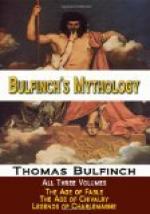Isoude passed her days in lamenting the absence and unknown fate of Tristram. One day her jealous husband, having entered her chamber unperceived, overheard her singing the following lay:
“My voice to piteous
wail is bent,
My harp to notes of
languishment;
Ah, love! delightsome
days be meant
For happier wights,
with hearts content.
“Ah, Tristram’
far away from me,
Art thou from restless
anguish free?
Ah! couldst thou so
one moment be,
From her who so much
loveth thee?”
The king hearing these words burst forth in a rage; but Isoude was too wretched to fear his violence. “You have heard me,” she said; “I confess it all. I love Tristram, and always shall love him. Without doubt he is dead, and died for me. I no longer wish to live. The blow that shall finish my misery will be most welcome.”
The king was moved at the distress of the fair Isoude, and perhaps the idea of Tristram’s death tended to allay his wrath. He left the queen in charge of her women, commanding them to take especial care lest her despair should lead her to do harm to herself.
Tristram meanwhile, distracted as he was, rendered a most important service to the shepherds by slaying a gigantic robber named Taullas, who was in the habit of plundering their flocks and rifling their cottages. The shepherds, in their gratitude to Tristram, bore him in triumph to King Mark to have him bestow on him a suitable reward. No wonder Mark failed to recognize in the half-clad, wild man, before him his nephew Tristram; but grateful for the service the unknown had rendered he ordered him to be well taken care of, and gave him in charge to the queen and her women. Under such care Tristram rapidly recovered his serenity and his health, so that the romancer tells us he became handsomer than ever. King Mark’s jealousy revived with Tristram’s health and good looks, and, in spite of his debt of gratitude so lately increased, he again banished him from the court.
Sir Tristram left Cornwall, and proceeded into the land of Loegria (England) in quest of adventures. One day he entered a wide forest. The sound of a little bell showed him that some inhabitant was near. He followed the sound, and found a hermit, who informed him that he was in the forest of Arnantes, belonging to the fairy Viviane, the Lady of the Lake, who, smitten with love for King Arthur, had found means to entice him to this forest, where by enchantments she held him a prisoner, having deprived him of all memory of who and what he was. The hermit informed him that all the knights of the Round Table were out in search of the king, and that he (Tristram) was now in the scene of the most grand and important adventures.




